Complete Solutions to EXERCISE 11.2 of chapter AREAS of Class 9 book with complete answers and questions
| Class 9 | MATHS |
| Chapter | AREAS |
| NCERT TELUGU | EXERCISE 11.2 |
| Number Of Questions | 8 |
| Academic Year | 2023-24 |
If E, F G and H are respectively the midpoints of the sides AB, BC, CD and AD of a parallelogram ABCD, show that ar(EFGH) `=1/2` ar (ABCD) .
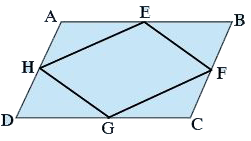
View SolutionWhat type of quadrilateral do you get, if you join `DeltaAPM, DeltaDPO, DeltaOCN and DeltaMNB` in the example 3.
View SolutionP and Q are any two points lying on the sides DC and AD respectively of a parallelogram ABCD show that `ar(DeltaAPB) = ar Delta(BQC)`
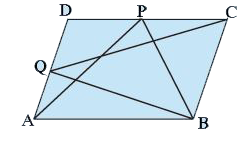
View SolutionP is a point in the interior of a parallelogram ABCD. Show that
(i) ar `(DeltaAPB) +ar (DeltaPCD)=1/2ar (ABCD)`
(ii) `ar(DeltaAPD)+ar (DeltaPBC)=ar(DeltaAPB)+ar(DeltaPCD)`
(Hint : Throught , P draw a line parallel to AB)
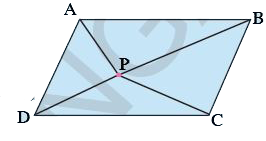
View SolutionIn the figure, x=…………….cm.
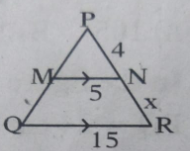
View SolutionPQRS and ABRS are parallelograms and X is any point on the side BR. Show that
(i) ar(PQRS) = ar(ABRS)
(ii) `ar(DeltaAXS) =1/2 ar(PQRS)`
View SolutionA farmer has a field in the form of a parallelogram PQRS as shown in the figure. He took the mid- point A on RS and joined it to points P and Q. In how many parts of field is divided? What are the shapes of these parts ?
The farmer wants to sow groundnuts which are equal to the sum of pulses and paddy. How should he sow? State reasons?
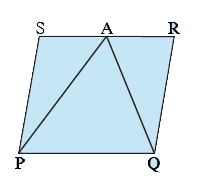
View SolutionProve that the area of a rhombus is equal to half of the product of the diagonals.
View Solution
EXERCISE 11.2 questions and complete solutions for chapter AREAS of NCERT Maths(Telugu) of Class 9